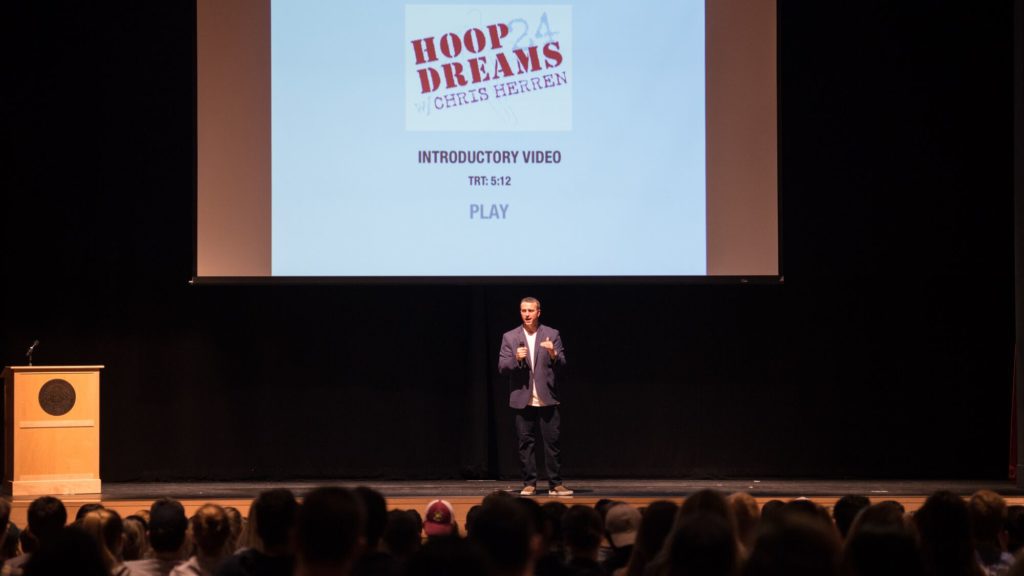By Irvin Zhang, news staff
After a video that showed highlights of his best days in the NBA, former Boston Celtics player Chris Herren took the stage in Blackman Auditorium Feb. 22 to tell the story of his worst days in front of hundreds of Northeastern University (NU) students. Between his struggles with cocaine and oxycontin and his near-death encounter with heroin, he disclosed every detail.
Herren, a Massachusetts native, spoke to 450 NU students about drug addiction at an event organized by the club basketball teams in partnership with NU’s chapter of the fraternity Delta Tau Delta.
Herren’s downward slope into drug abuse began at the age of 18, when he said he was pressured into snorting a line of cocaine.
“I looked at that one line of cocaine on my dorm room desk and said to myself, ‘I’ll try this drug one time and never do it again,’” Herren said. “I had no idea […]when I promised myself just one time, that that one line of cocaine would take 14 years to walk away from.”
Joseph Liddy, a member of Delta Tau Delta who helped organize the event, said he wanted to bring in someone who was high profile and relatable to students.
“I started asking around and a bunch of people had brought up Chris Herren because he had spoken at their high schools and he was very relatable: Boston Celtics player, Boston College alumni, just a Boston guy,” said Liddy, a third-year finance major.
Frank Devine, member of men’s club basketball, said Herren’s story struck a chord with him.
“It reminds me that it’s not worth taking the risk,” said Devine, a third-year finance major. “I may think that I’m not going to get addicted, that I’m not the addiction type, but from his story it shows, again, the slippery slope and severity of the problem.”
Herren’s struggle started with cocaine, and turned into dozens of oxycontin painkillers per day before reaching its lowest at heroin.
“People don’t think that just because you’re doing one thing that you’ll ever get to that end like what Chris [Herren] was doing,” Liddy said. “It’s very important that people understand that it is possible.”
While addicted to heroin, Herren said he “chased death for a feeling.” He forfeited his basketball career, strained the relationships around him and spent his fortunes chasing the next high.
With help from loved ones, he checked himself into treatment facilities and on August 1, 2008, he rid himself of his “sickness” and has been sober ever since.
Mackenzie Heiser, a senior engineering major, said she was touched by the efforts of those who reached out to Herren during his lowest hour.
“All of the people that went out of their way to be the guardian angel for him, it makes you think about what you can do for someone else,” Heiser said.
Herren wrapped up his presentation with stories of people who have come to him for advice because they too were struggling with drug abuse. Devine said these stories were revealing to him.
“It really opened my eyes to the gravity and the severity of the problem that people and communities face,” Devine said.
Herren said his goal is to impact just one person in the audience. Liddy said he hopes for the same thing.
“Being able to open this up to the entire campus and get such good turnout,” Liddy said. “I really hope it affected at least one person in that audience and make a big change in their life.”
Photo by Alex Melagrano









